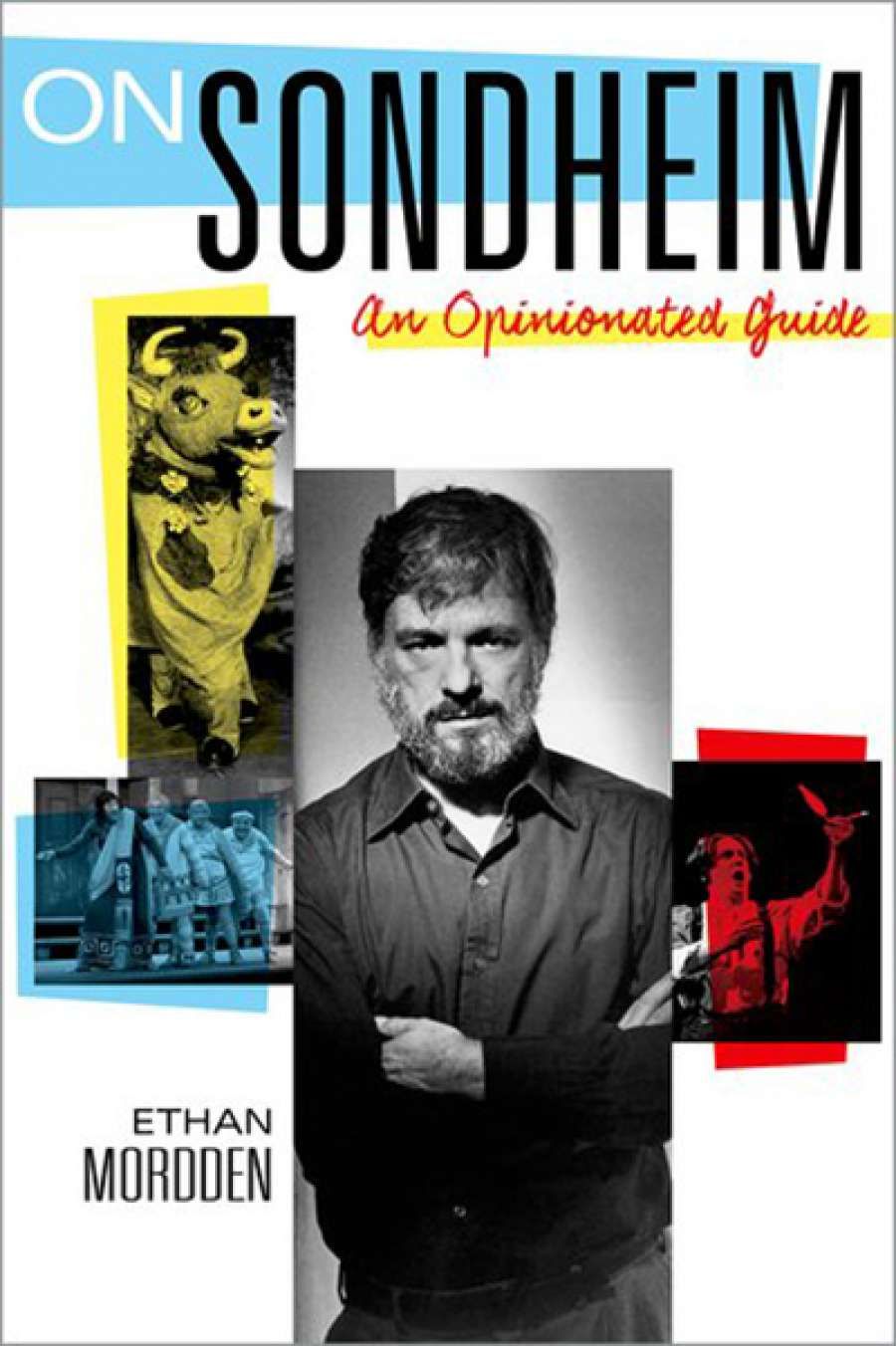
- Free Article: No
- Contents Category: Music
- Custom Article Title: Ian Dickson reviews 'On Sondheim: An Opinionated guide' by Ethan Mordden
- Book 1 Title: On Sondheim
- Book 1 Subtitle: An Opinionated Guide
- Book 1 Biblio: Oxford University Press $33.95 hb, 210 pp, 9780199394814
In the preface, Mordden sets out his approach while including a couple of typically sweeping and highly debatable claims. 'My intention is to bring the reader closer to Sondheim's oeuvre, to explore his unique approach to the creation of musicals while trying to position him in relation to developments in Western art, especially in twentieth century music and theatre. Sondheim is, after all, the man who intellectualized the American musical much as Eugene O'Neill intellectualized American drama and Faulkner intellectualized American fiction.' So much for Henry James.
 Stephen Sondheim in 1976 (courtesy of RR Auctions, via Wikimedia Commons)Mordden starts with a brisk overview of Sondheim's life and career. The prodigious young offspring of a broken marriage is taken up and mentored by the great lyricist Oscar Hammerstein. On Hammerstein's advice, Sondheim joins the extraordinarily talented team creating West Side Story as the lyricist. After taking the same role on Gypsy, he branches out both as composer and lyricist on A Funny Thing Happened on the Way to the Forum. Mordden traces the career through the pairings with Hal Prince and James Lapine and brings the reader up to date with the most recent version of the musical now known as Road Show. He finishes with a useful survey of Sondheim bibliography and discography.
Stephen Sondheim in 1976 (courtesy of RR Auctions, via Wikimedia Commons)Mordden starts with a brisk overview of Sondheim's life and career. The prodigious young offspring of a broken marriage is taken up and mentored by the great lyricist Oscar Hammerstein. On Hammerstein's advice, Sondheim joins the extraordinarily talented team creating West Side Story as the lyricist. After taking the same role on Gypsy, he branches out both as composer and lyricist on A Funny Thing Happened on the Way to the Forum. Mordden traces the career through the pairings with Hal Prince and James Lapine and brings the reader up to date with the most recent version of the musical now known as Road Show. He finishes with a useful survey of Sondheim bibliography and discography.
The heart of the book is a rather ad hoc description and analysis of each of Sondheim's musicals in chronological order. Ad hoc because of the haphazard focus on each work. Company, for example, gets eleven pages, while Into the Woods, which Mordden describes as 'perhaps the richest work of Sondheim's third period', gets a mere three and a half.
The three periods Mordden categorises are: first, the span from Sondheim's journeyman piece Saturday Night until his partnership with Hal Prince; second, his big-scale musicals created in collaboration with Prince; third, the smaller scale, more offbeat works that began with his collaboration with James Lapine.
For Mordden, it is in Company that Sondheim makes the break from musicals of the past. For him, it is 'the musical that, more than any other, definitively ended the Rogers and Hammerstein regime, with its straightforward structure made of dialogue scenes that build in power until they burst into song ... Company offers songs interfering with dialogue scenes.' This structural innovation, if that is what it was – Mordden mentions Rogers and Hammerstein's Allegro as a precursor, and Carousel also comes to mind – seems a slender hook on which to hang such a claim. It is possible to postulate, as does John Lahr, that 'the weakness of George Furth's book ... provides no semblance of a naturalistic environment ... the actors have little plot and no place to give them dimension ... and Company is exposed as the song cycle it really is'. One could argue that the real break came three shows later.
If one removes the breathtaking theatrical razzle-dazzle from Follies and the bittersweet operetta enchantment from A Little Night Music, both musicals, like Company, are about the romantic joys and tribulations of the middle class, a subject that has been the bread and butter of musical plots from the inception of the form. It was with Pacific Overtures that Sondheim and Prince took a step into the unknown. An American musical in Kabuki style on the topic of US cultural imperialism, the 1976 production was one of the most visually and conceptually innovative works ever to be presented on Broadway. (Dogmatism is catching!) Only one later Sondheim musical is primarily concerned with affairs of the heart, and the aptly named Passion is more about obsession than romance. From Pacific Overtures on, Sondheim has expanded the subject matter of the musical and invented new forms in which to present it.
Mordden claims to be writing for both the Sondheim novice and the aficionado and in a way he has succeeded. For the latter, the book, with its airy unproved generalisations, genuine aperçus, and interesting facts, is an irritating but stimulating read, while for the former it makes a quick, easily digested introduction.


Comments powered by CComment